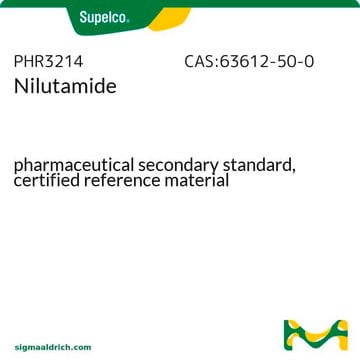N8534
Nilutamide
solid
Synonym(s):
5,5-Dimethyl-3-[4-nitro-3-(trifluoromethyl)phenyl]-2,4-imidazolidinedione, Anandron, RU-23908
About This Item
Recommended Products
form
solid
originator
Sanofi Aventis
SMILES string
CC1(C)NC(=O)N(c2ccc(c(c2)C(F)(F)F)[N+]([O-])=O)C1=O
InChI
1S/C12H10F3N3O4/c1-11(2)9(19)17(10(20)16-11)6-3-4-8(18(21)22)7(5-6)12(13,14)15/h3-5H,1-2H3,(H,16,20)
InChI key
XWXYUMMDTVBTOU-UHFFFAOYSA-N
Gene Information
human ... AR(367)
Looking for similar products? Visit Product Comparison Guide
Application
- as a nuclear androgen receptor (nAR) inhibitor to study its effects on oocyte maturation in zebrafish
- to determine its effects on bioluminescent Saccharomyces cerevisiae bioreporters in BLYAS assay
- as a substrate in hydrogenation reaction
Biochem/physiol Actions
Features and Benefits
Signal Word
Danger
Hazard Statements
Precautionary Statements
Hazard Classifications
Acute Tox. 3 Oral - Repr. 1B
Storage Class Code
6.1C - Combustible acute toxic Cat.3 / toxic compounds or compounds which causing chronic effects
WGK
WGK 3
Flash Point(F)
Not applicable
Flash Point(C)
Not applicable
Personal Protective Equipment
Certificates of Analysis (COA)
Search for Certificates of Analysis (COA) by entering the products Lot/Batch Number. Lot and Batch Numbers can be found on a product’s label following the words ‘Lot’ or ‘Batch’.
Already Own This Product?
Find documentation for the products that you have recently purchased in the Document Library.
Our team of scientists has experience in all areas of research including Life Science, Material Science, Chemical Synthesis, Chromatography, Analytical and many others.
Contact Technical Service









